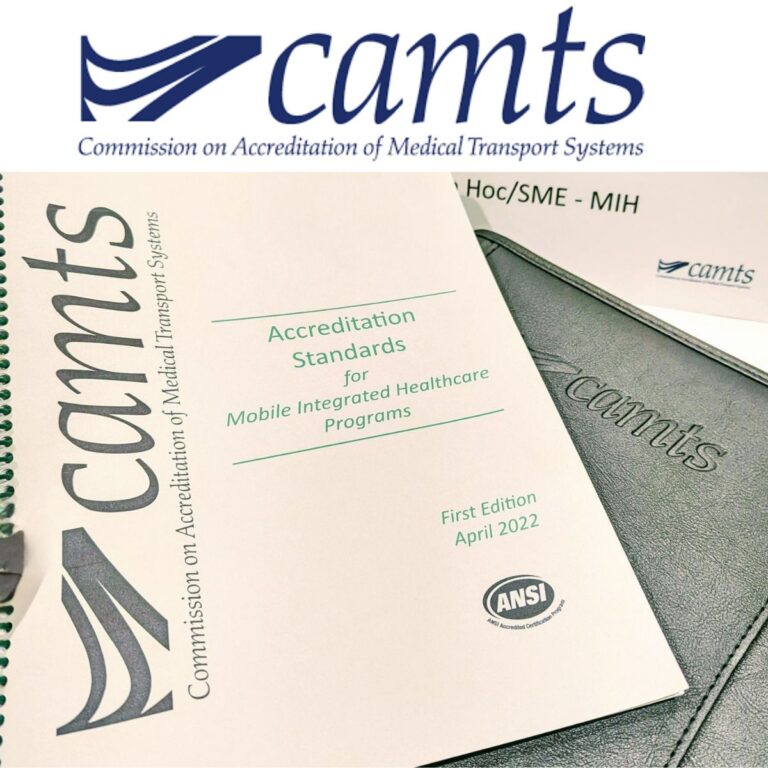Industry Definitions
Mobile Integrated Health
Click for definition
Mobile Integrated Health (MIH)
Mobile Integrated Health (MIH) is a coordinated, patient-centered, evidence-based, holistic model of care using collaborative, interdisciplinary teams to serve patient needs at the most appropriate level of care at a safe out-of-hospital location.
Community Paramedicine
Click for definition
Community Paramedicine
Community Paramedicine is a segment of Mobile Integrated Healthcare (MIH) which is provider-led, patient-centered care delivery model using appropriately trained Emergency Medical Services (EMS) clinicians in an expanded role to render care, facilitate more efficient delivery of care, and enhance access to community resources.

MIH Program Accreditation
The Commission on Accreditation of Medical Transport Systems (CAMTS) is a peer review organization dedicated to improving patient care and safety by providing a dynamic accreditation process.
CAMTS was the first global entity to establish Mobile Integrated Health Accreditation Standards.
To learn more about MIH Accreditation and to view the MIH Standards online, visit www.camts.org
Training and Education Core Competencies
- Introduction to Mobile Integrated Health and Community Paramedicine, Program Types and Variations
- Professional Boundaries | Client Engagement and Motivational Interviewing Techniques
- Interactions: Types of Visits, Best Practices, Determining Visit Cadence, Determining Enrollment Terms
- The Role of the Mobile Integrated Health and Community Paramedicine in Public Health | Community Outreach
- Social Determinants of Health and Health Equity
- Community Needs Assessment | Identification of Target Populations
- Insurance | Federal and Local Programs | SSI, SSDI, and/or Disability
- Learning Styles | Addressing Communication Barriers and Low Health Literacy
- Documentation | Longitudinal and Standard Assessments (e.g. Satisfaction Survey | Wellness Survey | Care Plan | Clinical Assessments)
- Home Safety Assessments and Interventions (e.g. PEAT Score)
- Ethics and Cultural Competence
- Personal Safety and Wellness
- Plan of Care | Goals and Care Plan Establishment | Multi-disciplinary Approach to Care Plan Interventions and/or Care Coordination
- Chronic Disease Management and Education (How to Develop and Teach)
- Behavioral Health and Substance Use Disorders | Mental Health First Aid Training
- Long Term Care | Assisted Living, Skilled Nursing, Rehab, Rehab Hospital and Determination of Need
- Communication Strategies for Special Needs Populations
- Communication Strategies for Pediatric, Geriatric, or other Special Populations
- Special Considerations (e.g. Bariatric Care, High-risk Pregnancy, Substance Use Disorder or Addiction, General Special Needs, Abuse and Neglect
- Patient Needs Assessment
- Pathophysiology
- Patient Assessment
- Lab Values/Point of Care Testing
- Geriatrics
- Hospice and Palliative Care
- Nutrition
- Pharmacology
- Immunizations
- Internship/Orientation
- PCP Office Rotations
- Respiratory (COPD/PNA)
- Cardiac Care
- Renal and Endocrinology
- Behavioral Health
- Substance Use Disorders
- Wound Care and Assessment
- Trach Care and Replacement
- Ultrasound
- Infusions, PICC Lines and CVCs
- Lab Draws and Point-of-Care Testing
CAMTS MIH Accreditation - Education Standards
Education and training recommendations for Mobile Integrated Health and Community Paramedicine programs are outlined in the CAMTS Accreditation Standards for Mobile Integrated Healthcare, within 03.00.00 Patient Care | MIH 03.05.00 Orientation and Continuing Education.
